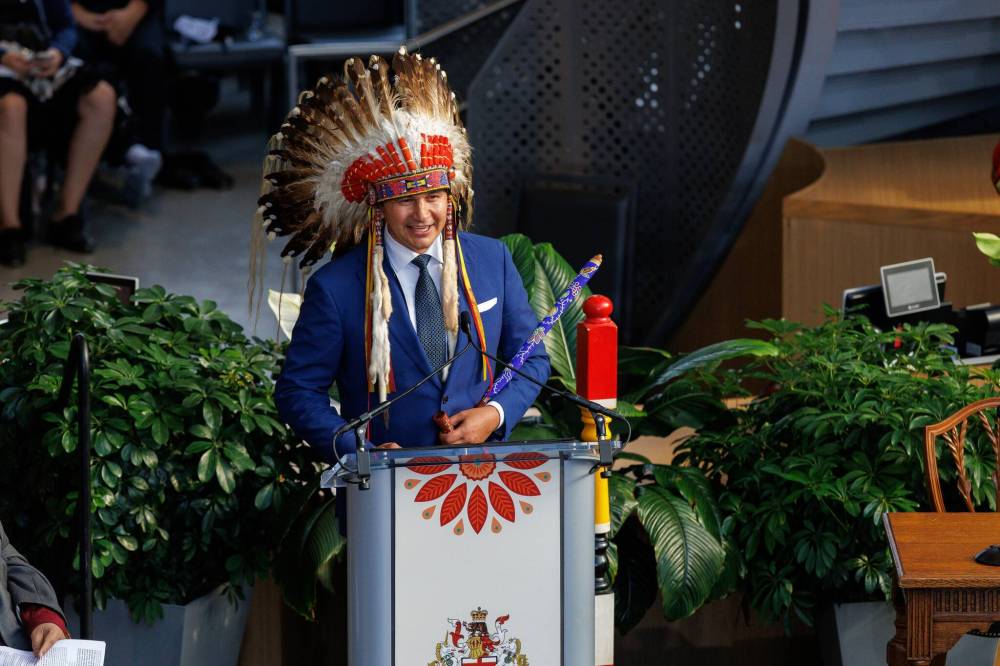Spirit of treaties takes shape in Manitoba
Advertisement
Read this article for free:
or
Already have an account? Log in here »
To continue reading, please subscribe:
Monthly Digital Subscription
$0 for the first 4 weeks*
- Enjoy unlimited reading on winnipegfreepress.com
- Read the E-Edition, our digital replica newspaper
- Access News Break, our award-winning app
- Play interactive puzzles
*No charge for 4 weeks then price increases to the regular rate of $19.00 plus GST every four weeks. Offer available to new and qualified returning subscribers only. Cancel any time.
Monthly Digital Subscription
$4.75/week*
- Enjoy unlimited reading on winnipegfreepress.com
- Read the E-Edition, our digital replica newspaper
- Access News Break, our award-winning app
- Play interactive puzzles
*Billed as $19 plus GST every four weeks. Cancel any time.
To continue reading, please subscribe:
Add Free Press access to your Brandon Sun subscription for only an additional
$1 for the first 4 weeks*
*Your next subscription payment will increase by $1.00 and you will be charged $16.99 plus GST for four weeks. After four weeks, your payment will increase to $23.99 plus GST every four weeks.
Read unlimited articles for free today:
or
Already have an account? Log in here »
Hey there, time traveller!
This article was published 18/10/2023 (776 days ago), so information in it may no longer be current.
It’s unlikely Manitoba’s first lieutenant-governor, Adams Archibald, imagined a First Nations person would ever become premier of the fledgling province he took leadership of in 1870.
The former Nova Scotia politician and Father of Confederation represented the Crown in negotiations with seven First Nations in Manitoba during the making of the first numbered treaty in Canada (Treaty 1).
Archibald spent most of the nine days during Treaty 1 talks during the summer of 1871 trying to convince First Nations leaders to abandon their traditional way of life, to take up farming and “adopt the habits of the whites.”

MIKE DEAL / WINNIPEG FREE PRESS
Manitoba NDP Leader Wab Kinew was sworn in Wednesday as the province’s 25th premier in a ceremony filled with Indigenous culture and traditions. The Fort Rouge MLA became the first First Nations premier of a Canadian province after taking the oath of office from Lt.-Gov. Anita Neville in front of an invitation-only crowd at The Leaf horticultural exhibit in Assiniboine Park.
The queen’s representative could not have known it at the time, but Canada would later impose coercive assimilative policies on Indigenous people, in direct contravention of the terms of the numbered treaties.
Anishinaabe and Swampy Cree chiefs who negotiated Treaty 1 agreed to share the land and to live in peace and harmony with newcomers. It’s hard to imagine even they believed one of their people would one day become premier of Manitoba.
That day happened Wednesday. NDP Leader Wab Kinew, who is Anishinaabe, was sworn in as Manitoba’s first First Nations premier at the Leaf horticultural centre at Assiniboine Park.
In many ways, it’s exactly what the treaties were meant to achieve: for Indigenous and non-Indigenous people to live together in a mutually respectful relationship.
It was a watershed moment for Canada.
Former senator Murray Sinclair, who presided over the signing of the oaths during the swearing-in ceremony, called it a “true act of reconciliation.” It was that and more.
Treaties established a framework for people to live together in peace, to share the land equally and to honour each other’s culture, languages and way of living. It didn’t work out that way for most of the past 150 years, but that’s what was agreed to.
While neither Crown negotiators nor First Nations chiefs likely anticipated in the 1870s the extent to which those goals might one day be fulfilled, Kinew’s premiership takes the spirit of the treaties to the next logical level: for Indigenous and non-Indigenous people to share decision-making equally at the highest levels of governments. In some ways, it represents the ultimate achievement in treaty relations.
That mutual respect was on full display during the cabinet swearing-in ceremony Wednesday, which included Indigenous prayers, dance and song — not unlike the Indigenous ceremonies that took place at Lower Fort Garry prior to Treaty 1 negotiations in 1871.
Also, for the first time in Manitoba history, two First Nations women — Nahanni Fontaine (families) and Bernadette Smith (housing, addictions and homelessness) — were appointed to cabinet.
The level of cultural respect and inclusivity was a stark contrast to the generations of genocidal and assimilative policies Indigenous people have been subjected to.
Kinew’s decision to appoint himself minister responsible for Indigenous reconciliation, a first for a Manitoba premier, was also significant. He called it a “structural change” in how the province intends to work with Indigenous people and their governments.
“The message that I am sending is simple, and it is to the leaders of Indigenous governments across Manitoba,” Kinew said during the ceremony. “Our government will recognize you for what you are, the leaders of governments — governments, just like the other orders of governments in Manitoba, Canada and across North America.”
As Indigenous reconciliation minister, Kinew said he is also committed to improving relations between people, not just levels of government.
“To you, the people of Manitoba, I am committed to take personal responsibility within our government to build better relationships across all of our communities in Manitoba,” said Kinew “We are one people and we all have the right to be treated equally.”
Kinew did not run for office to become Manitoba’s first First Nations premier. He ran to become premier, regardless of his background.
The fact he is Anishinaabe is an important part of reconciliation. It shows Manitobans are prepared to put their trust behind someone whose people have been subjected to generations of marginalization and derision. That’s progress.
However, Kinew will not be judged during his time in public office as an Indigenous premier.
He will be judged as a premier. He will be held accountable for his actions and policy decisions. That’s the true meaning of equality — the kind contemplated in the treaties.
It’s a glowing example of how Canada can build a more equitable, compassionate and respectful nation.
tom.brodbeck@freepress.mb.ca

Tom Brodbeck is an award-winning author and columnist with over 30 years experience in print media. He joined the Free Press in 2019. Born and raised in Montreal, Tom graduated from the University of Manitoba in 1993 with a Bachelor of Arts degree in economics and commerce. Read more about Tom.
Tom provides commentary and analysis on political and related issues at the municipal, provincial and federal level. His columns are built on research and coverage of local events. The Free Press’s editing team reviews Tom’s columns before they are posted online or published in print – part of the Free Press’s tradition, since 1872, of producing reliable independent journalism. Read more about Free Press’s history and mandate, and learn how our newsroom operates.
Our newsroom depends on a growing audience of readers to power our journalism. If you are not a paid reader, please consider becoming a subscriber.
Our newsroom depends on its audience of readers to power our journalism. Thank you for your support.









